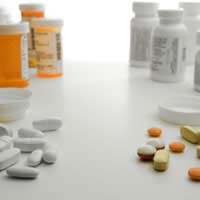Types of Medicine Interactions

Your medicine cabinet contains a plethora of remedies to keep you healthy but the wrong combination can severely put your health at risk. Often it's hard to remember just how potent drugs are and their effects can be amplified many times over when combined with other medications.
Over The Counter Does Not Mean Safe
It can be easy to overlook the possibility of drug interactions when it comes to over the counter drugs. There is a tendency to think of them as mild, harmless drugs that can't do much harm since they don't require a prescription. This, however, is far from the truth. Many people are sent to emergency rooms each year due to over the counter drug interactions. Checking labels carefully and asking your doctor or pharmacist for information about mixing medications can prevent interactions.Drug To Drug Interactions
Drug-drug interactions occur when one drug reacts with either one or several other drugs. These are one of the most common types of interactions and also potentially the most dangerous. Examples include:- Aspirin: Well known and commonly used to relieve pain, aspirin also thins the blood and can trigger bleeding when taken with a blood thinner such as warfarin.
- Antidepressants: Generally, older antidepressants such as monoamine oxidase inhibitors don't fare well when taken with newer antidepressants such as selective serotonin reuptake inhibitors. This combination can leave you with elevated blood pressure and side effects such as dizziness. Herbal remedies such as St.John's wort- often used to treat mild depression- don't mix well with prescription antidepressants and can also affect blood pressure.
- Diabetes drugs: There is a range of medications that can clash with drugs you may take regularly to treat diabetes. Corticosteroids, hormone treatments, blood thinners, antidepressants and aspirin can either compromise the effectiveness of diabetes drugs or dangerously intensify their effects.
- Antibiotics: Most people have taken antibiotics at some point for a bacterial infection and they are commonly prescribed medications. Antibiotics don't generally mix well with over the counter antacids and can clash with minerals such as iron and calcium. Also important to note is that antibiotics can decrease the effectiveness of oral contraceptives, so women need to be careful about the potential for pregnancy.
- Medications for heart: With heart disease so prevalent today and continually increasing in rate, many adults are taking heart medications. Some of the mood stabilising drugs also tend to increase the effects of heart medications so care must be taken. Also, the popular drug for erectile dysfunction- diazepam- can cause a huge drop in blood pressure when taken with heart drugs such as nitrates.
Drug to Food and Beverage Interactions
We think of eating as a normal and generally harmless activity that is necessary each day, but little thought is often given to the possibility of interactions with drugs we may be taking for health conditions. Unfortunately, many over-the-counter and prescription drugs can cause adverse effects with specific beverages or foods. A food can have a dramatic effect on how your body metabolizes a drug. Some interactions to watch out for include:- Grapefruit juice: It may seem healthy and safe but it can block enzymes that process drugs such as calcium channel blockers. This means that a higher level of the drug remains in your bloodstream, amplifying the effects.
- Alcohol: It frequently interacts poorly with a great number of medications, from antidepressants to simple over the counter pain relievers to headache medications. Frequent mixing of pain relievers such as aspirin or ibuprofen with alcohol can leave you susceptible to stomach ulcers and frequent gastrointestinal discomfort.
- Cheese: Tyramine containing foods such as cheese clash with older antidepressants, so care should be taken to limit these foods.
Drug to Condition Interactions
Drug-condition interactions occur when you are taking a drug, or combination of drugs, to treat a medical condition, and the side effects cause additional problems with another medical condition. For example, over the counter drugs used to treat nausea and travel sickness can exacerbate symptoms that accompany bladder conditions or glaucoma. Other common drug-condition interactions are:- Antihistamines: Any breathing problems such as asthma can be intensified by antihistamine medications.
- Nasal decongestants: These may clash with conditions such as heart disease, diabetes or asthma.
Related Articles in the 'Medication Use' Category...
- New Ways to Use Common Medicines
- Medicine Cabinet and Placebos
- A Medicines from What's in Your Garden?
- Newest Medicine Cabinet Alternative Treatments
- Administering Ear and Eye Drops Safely
- What is a Medication Dispenser?
- Special Cautions for Antibiotic Use
- Tips for Safe Medication Use
- Read the Leaflet: Avoiding Medication Overdose
- The Dangers Of Combining Medications


Re: The Dangers Of Combining Medications
My Brother & I have been trying to research on his new Meds & in last couple months
Re: Useful Contents In A First Aid Kit and How To Use Them
It is good to know how to administer first aid.